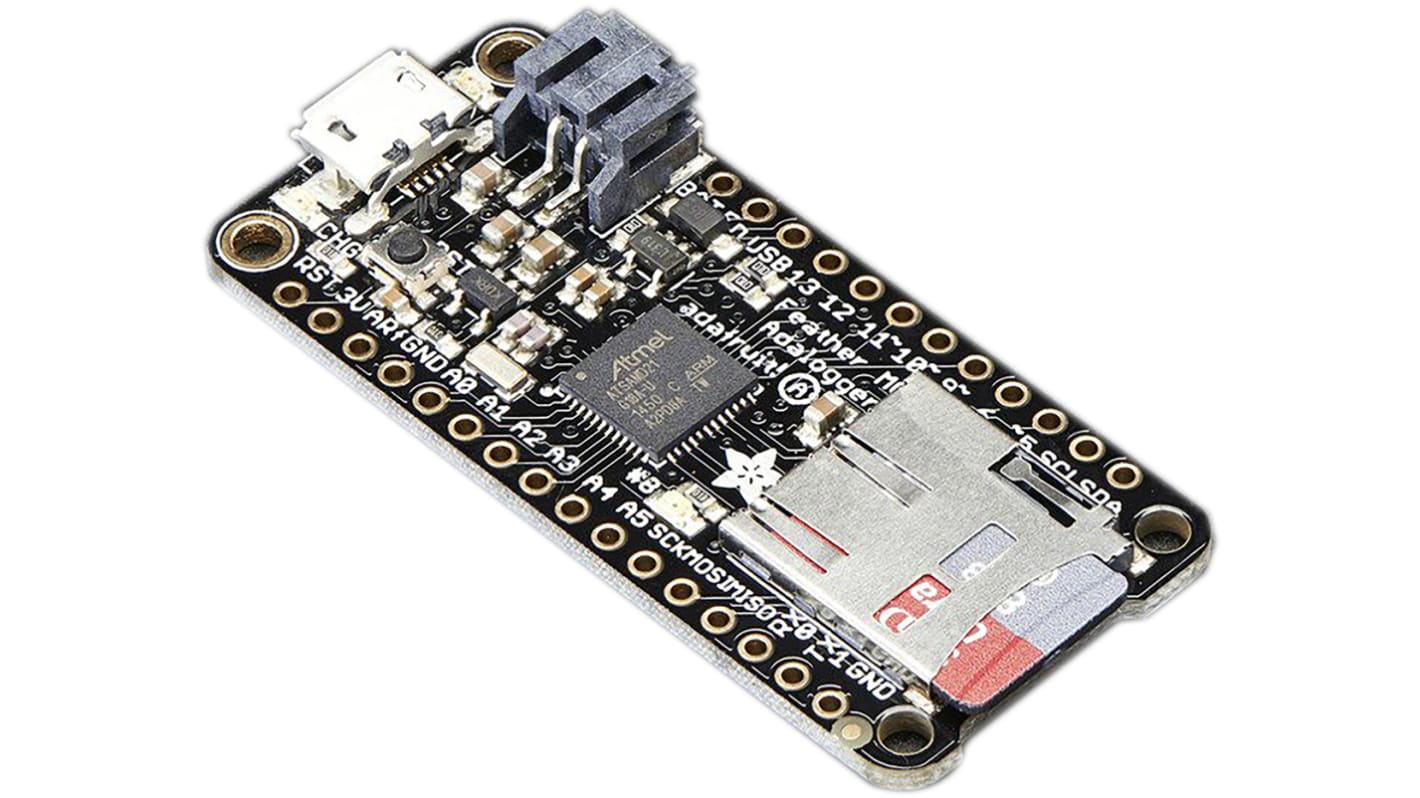ADAFRUIT Feather M0 Adalogger MCU Development Board 2796
- RS-artikelnummer:
- 124-5517
- Distrelec artikelnummer:
- 300-91-198
- Tillv. art.nr:
- 2796
- Tillverkare / varumärke:
- ADAFRUIT INDUSTRIES

Antal (1 enhet)*
205,17 kr
(exkl. moms)
256,46 kr
(inkl. moms)
GRATIS leverans för online beställningar över 500,00 kr
I lager
- 61 enhet(er) är redo att levereras
- Plus 19 enhet(er) är redo att levereras från en annan plats
Behöver du mer? Ange den kvantitet du behöver och klicka på "Kontrollera leveransdatum"
Enheter | Per enhet |
|---|---|
| 1 + | 205,17 kr |
*vägledande pris
- RS-artikelnummer:
- 124-5517
- Distrelec artikelnummer:
- 300-91-198
- Tillv. art.nr:
- 2796
- Tillverkare / varumärke:
- ADAFRUIT INDUSTRIES
Specifikationer
Datablad
Lagstiftning och ursprungsland
Produktdetaljer
Hitta liknande produkter genom att välja ett eller flera attribut.
Välj alla | Attribut | Värde |
|---|---|---|
| Brand | ADAFRUIT INDUSTRIES | |
| Classification | Development Board | |
| Kit Name | Feather M0 Adalogger | |
| Technology | MCU | |
| Device Core | Cortex-M0 | |
| Processor Family Name | ARM | |
| Processor Part Number | ATSAMD21G18 | |
| Processor Type | MCU | |
| Välj alla | ||
|---|---|---|
Brand ADAFRUIT INDUSTRIES | ||
Classification Development Board | ||
Kit Name Feather M0 Adalogger | ||
Technology MCU | ||
Device Core Cortex-M0 | ||
Processor Family Name ARM | ||
Processor Part Number ATSAMD21G18 | ||
Processor Type MCU | ||
Adafruit Feather M0 Adalogger Board
What is Adafruit Feather?
Adafruit Feather is a family of thin, lightweight development boards made for prototyping. They are designed to be used on their own, or are stackable for multiple functionalities. Feather boards can be both battery operated or have a microUSB port for a PSU to be connected.
There is a family of products surrounding the Adafruit Feather range to help you get your projects up and running.
More about the Feather M0 Adalogger …
This board features the ATSAMD21G18 ARM Cortex M0 processor at its core - the same as the Arduino Zero! It has a huge 256K FLASH memory and 32K of RAM. That’s significantly more than other Adafruit Feather boards which use the Atmega328 or 32u4 chips.
The Feather M0 Adalogger can be used alongside the Arduino IDE to enable you to get developing and prototyping much quicker.
It’s portable!
You have the option to use either a 3.7V Lithium polymer battery, or connect to a PSU via microUSB. If you choose to power your Feather HUZZAH board by battery, it makes it portable. So you can take it with you, wherever you need to. If you need to recharge it at any point, just plug it in via the microUSB and it will recharge.
Here’s the facts & figures:
Chip: ATSAMD21G18 @ 48MHz with 3.3V logic/power
Memory: 256KB FLASH + 32KB of RAM
Power: 3.3V regulator with 500mA peak current output
GPIO: 20 pins
Analogue inputs: 10
PWM: 8 pins
No EEPROM
Size: 51 x 23 x 8 mm (without headers)
Featherweight: 5.3g
Charging: Built in 100mA LiPoly charger with charging status indicator light
Adafruit Feather M0 Development Boards
The Feather M0 is a range of development board from Adafruit. They are powered by the Atmel ATSAMD21G18 ARM Cortex M0 processor clocked at 48 MHz with 3.3 V logic. This board features the same chip as is in the Arduino Zero (RS 883-7383). It has 256K of flash (8x more than the Feather 32u4 range) and 32K of RAM (16x). The Feather M0 is designed for low power, portable projects.
There is a dedicated connector for 3.7 V Lithium batteries. The built-in battery charging circuit enables you can use to measure and monitor battery levels. Battery and USB cable not included.
This chip has built-in USB so it has USB-to-serial programming & debug capability so no need for an FTDI-like chip.
Supplied fully assembled and tested, with a USB bootloader that lets you quickly use it with the Arduino IDE.
- 51 x 23 x 8 mm / 2.0" x 0.9" x 0.28" without headers
- 4.6 g
- Atmel ATSAMD21G18 @ 48 MHz with 3.3 V logic/power
- 256 KB Flash and 32 KB RAM (No EEPROM)
- 32.768 kHz crystal for clock generation & RTC
- 3.3 V regulator with 500 mA peak current output
- USB native support, comes with USB bootloader and serial port debugging
- 20 GPIO pins
- Hardware Serial, hardware I²C, hardware SPI support
- PWM outputs on all pins
- 6 x 12-bit analogue inputs
- 1 x 10-bit analogue output (DAC)
- Built in 100 mA LiPo charger with charging status indicator LED
- Pin #13 red LED for general purpose blinking
- Power/enable pin
- 4 mounting holes
- Reset button
Relaterade länkar
- ADAFRUIT Feather 32u4 Adalogger MCU Development Board 2795
- ADAFRUIT Feather M0 Basic Proto MCU Development Board 2772
- ADAFRUIT Feather M0 Bluefruit LE MCU Development Board 2995
- ADAFRUIT Feather M0 WiFi Development Board 3010
- ADAFRUIT Feather 32u4 Basic Proto MCU Development Board 2771
- ADAFRUIT Feather 32u4 Bluefruit LE MCU Development Board 2829
- ADAFRUIT Feather HUZZAH WiFi Development Board 2821
- ADAFRUIT TRINKET 5V MCU Development Board 1501
